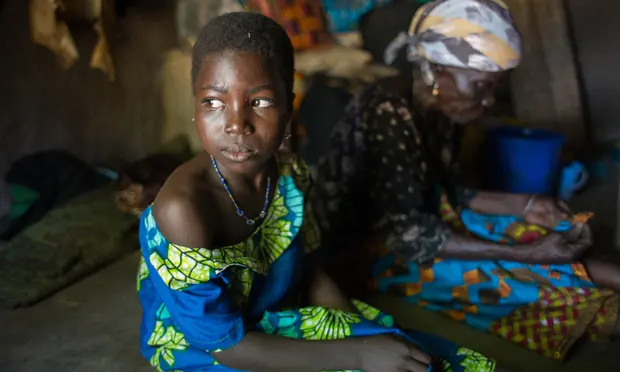Witch-hunts and ritual child abuse are a stain on Africa. We must confront them

As Africa emerges blinking into the post-pandemic sunlight, children across the continent might hope for a brighter future. Lockdowns drove a surge in violence against children – especially girls – but surely life can now start to improve.
Sadly not.
No sooner does Covid begin to recede than we hear news of another appalling failure to protect the rights and wellbeing of African children. It scarcely seems credible that the horror of witchcraft accusations and ritual abuse against girls and boys across the continent is emerging again in 2022.
I have no wish to criticise beliefs that underpin traditional African healing or religious practices. Witchcraft is deeply rooted in many cultures and communities in sub-Saharan Africa, and is a powerful influence in the lives of millions. In some countries, witchcraft and associated traditional beliefs are interlinked and deeply valued. But when those beliefs and values spill over into unspeakable physical and psychological violence against children, we have to speak out.
Every year, thousands of children are accused of witchcraft and suffer ritual abuse and attacks, crimes “hidden in plain sight”. Children with albinism are at much higher risk. Many governments look away, despite being signatories to the African charter on the rights and welfare of the child and the UN's convention on the rights of the child.
Children are subjected to physical and psychological violence, including public humiliation and forced confessions, torture, violent beatings, traditional “cleansing” medicines, expulsion from home and community, and – in extreme cases – murder. The impacts on mental health – including isolation, neglect, bullying, victimisation and poor self-esteem – can be lifelong and life-threatening.
The ordeal of a 13-year-old Beninese girl – let's call her Effia – highlighted in a new report from the African Child Policy Forum (ACPF), saddens and enrages me. She had to spend years in a shelter after being accused of witchcraft. When she did eventually return home, she was shunned by her family and community, and within a week had to seek protection once more. “Everyone suspected me of being a witch – their looks, actions and words were just unbearable,” Effia said. “Everyone said that I was a witch. They said I ate someone, but they wouldn't tell me who I ate.”
Such stories are heartbreakingly common. Accusations can come from friends, family, neighbours, schoolmates or co-workers, and are driven by fear, revenge, jealousy, resentment or greed. Witchcraft accusations can be a form of scapegoating for a community's troubles.
Although less common than witchcraft accusations, ritual attacks on children – especially those with albinism – are also often motivated by greed, a desire for power or a belief that their body parts can stave off ancestral wrath and cure everything from male impotency to poverty. Girls with albinism and mothers of children with albinism suffer extreme violence, including having their arms and legs hacked off while still alive.
It is not just children. Older women are singled out for attacks, sometimes murdered – as are people with disabilities or mental illness. And it is not a uniquely African issue – Papua New Guinea and India have also had cases in recent years. But we cannot deny a particular problem when it comes to Africa's children – and African governments that have ignored attacks on children for far too long.
I am encouraged by some signs of progress. Earlier this year the UN Human Rights Council passed a resolution condemning accusations of witchcraft, rituals and harmful traditions that violate human rights. In Malawi, new laws resulted in reported attacks on people with albinism declining from 60 in 2016 to four in 2021. Uganda passed legislation last year banning human sacrifice and the possession of body parts. Tanzania has established safe houses to protect children with albinism.
However, ACPF's research shows that, despite child protection laws, there remains a widespread problem in Benin, Burkina Faso, Ethiopia, Ghana, Madagascar, Niger, Angola, Eswatini, Liberia, Rwanda, Zimbabwe, Burundi, the Democratic Republic of the Congo, Tanzania, Central African Republic, Nigeria and South Africa.
The ray of sunshine is that we Africans have the answers. Homegrown solutions championed by faith and community leaders stand the best chance. Many communities are devising rituals to protect themselves against witchcraft that do not involve harming children. Governments must support this with policies and go further to invest in inclusive child protection.
Dr Joan Nyanyuki is executive director of the African Child Policy Forum
Sign up for Her Stage to hear directly from incredible women in the developing world on the issues that matter to them, delivered to your inbox monthly:
This “Eyes on Trafficking” story is reprinted from its original online location.

ABOUT PBJ LEARNING
PBJ Learning is a leading provider of online human trafficking training, focusing on awareness and prevention education. Their interactive Human Trafficking Essentials online course is used worldwide to educate professionals and individuals how to recognize human trafficking and how to respond to potential victims. Learn on any web browser (even your mobile phone) at any time.
More stories like this can be found in your PBJ Learning Knowledge Vault.
EYES ON TRAFFICKING
This “Eyes on Trafficking” story is reprinted from its original online location.
ABOUT PBJ LEARNING
PBJ Learning is a leading provider of online human trafficking training, focusing on awareness and prevention education. Their interactive Human Trafficking Essentials online course is used worldwide to educate professionals and individuals how to recognize human trafficking and how to respond to potential victims. Learn on any web browser (even your mobile phone) at any time.
More stories like this can be found in your PBJ Learning Knowledge Vault.
